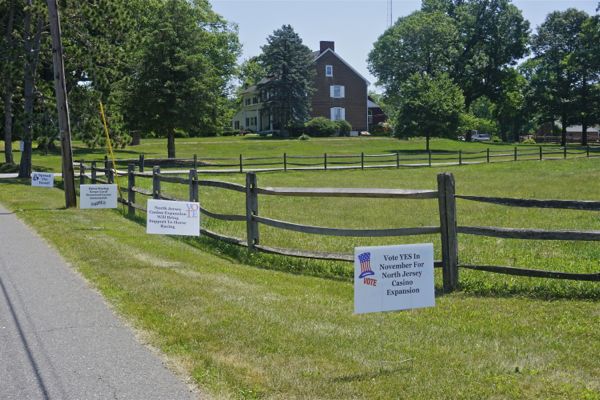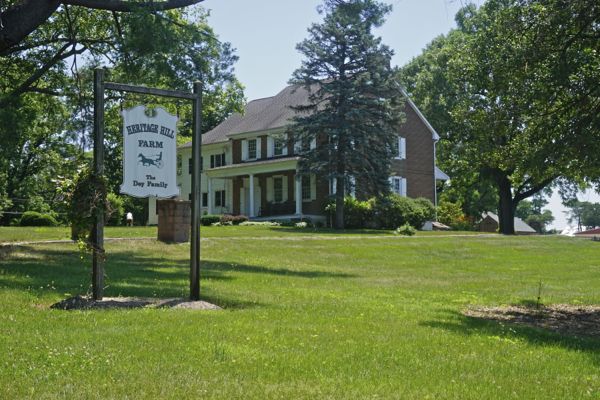Casino Gambling Partners With Farmland Preservation
Another faction of the Green Mafia
I know very little about the politics of the Farmland Preservation program – other than the greed and the attack on the Highlands and the lies of the Farm Bureau – or horse farms and horse racing, and even less about casino gambling.
But what I do know is that the former is associated with idyllic landscapes and enjoys a very favorable public image, while the latter is associated with the mob and various social pathologies and cultural taboos practiced in places like the streets of Atlantic City.
What two enterprises could be more different?
So I was shocked while riding my bike to see pro-casino gambling signs at the lovely Heritage Hill horse farm, just above Walnford Park in Allentown:
Heritage Hill Farm, spanning 500 acres in western Monmouth County, is one of the founding farms of the New Jersey Sire Stakes program. The Heritage Hill – HH – name was given to nearly 100 horses, including the world champion filly HH Shadow who was second in the 1986 Cane Pace and retired with 17 victories and nearly $280,000 in earnings.Heritage Hill stood 1972 Pacing Horse of the Year Isle of Wight, whose offspring dominated the New Jersey Sire Stakes in the late 1970s and early 1980s. The farm no longer stands any stallions – the last was Jaguar Spur — but the Deys breed and foal nearly 100 mares a year.
Thinking this group of signs – like the handful of Trump signs out there – just a quirky family promotion at one horse farm, I ignored it.
But a week later I saw another group of exactly the same signs at another horse farm in Chesterfield and I knew this was no isolated event, but rather an organized political campaign.
A quick Google reveals that gambling, horse racing, and farmland preservation are linked in politics – see this recent Report by Governor Christie’s Advisory Commission on NJ Gaming, Sports, and Entertainment:
Malinowski and Avenatti predicted in 2009 that the Garden State could lose its premier agribusiness which generated $780 million of economic impact annually, 7,000 jobs, $110 million in federal, state and local taxes and 57,000 acres of working agricultural landscape and open space if racing-related training and breeding farms left New Jersey. Only eight percent of acreage in the Farmland Preservation Program was used for horse-related activities and eleven percent of preserved farms were actually in the horse business (Malinowski and Avenatti, 2009). Acreage supported by equine-related interests made up 25 percent of the total farmland in New Jersey (Gottlieb, et al., 2009). This fact reinforced the argument that the state stood to lose this farmland to development if racing was no longer viable. It was also suggested that racing was not the only equine discipline in jeopardy if New Jersey racing was not sustained. Sport competition and recreational horse users also stood to suffer, as would traditional agricultural interests such as grain, hay, and straw farmers who continue to remain in business and maintain agriculturally productive open space due to the fact that their major customers are horse owners.
Have these folks no knowledge of land use planning and regulation? They assume that all horse farms would be converted to development? That market forces alone determine land use?
This worldview of sleaze and greed really should have come as no surprise, given the self-interested inside money deals, upward redistribution of public funds to wealthy elites, and avoidance of advocacy of “coercive” government land use planning and regulation I’ve seen in the open space preservation program that I’ve called “The Green Mafia”.
So, enterprising investigative journalists out there, I smell a story – how much money is going from the casino industry to NJ horse farms to promote the ballot question? Who is paying who and how much?
I’ll be voting “NO” on the casino question – and find it reprehensible that preservation of the landscape and open space are being used as pawns and a pretext to support the casino industry.

